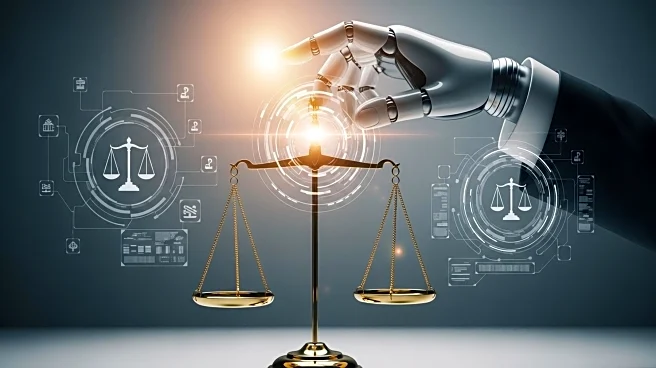What's Happening?
Legal experts Renee R. Roth and William P. LaPiana have published an article discussing the integration of artificial intelligence (AI) into trust and estate law. The article highlights a proposed statute aimed at applying a no-contest or in terrorem clause to trusts, a legal provision that discourages beneficiaries from challenging the terms of a will or trust. The authors also examine a recent decision by the highest court of the state regarding such clauses. Historically, these clauses have been governed by statute since 1946, initially under DEL sec. 126, and later recodified by the Bennett Commission as EPTL 3-3.5. The discussion underscores the importance of human oversight in the application of AI within legal frameworks, particularly in sensitive areas like trust and estate law.
Why It's Important?
The integration of AI into trust and estate law represents a significant shift in how legal processes are managed, potentially increasing efficiency and accuracy. However, the emphasis on human oversight is crucial to ensure ethical and fair application of AI technologies. This development could impact legal professionals, beneficiaries, and the broader legal system by altering traditional practices and introducing new challenges related to AI governance. Stakeholders in the legal industry must consider the implications of AI on privacy, decision-making, and the potential for bias, making human oversight a critical component in maintaining trust and integrity in legal proceedings.
What's Next?
As AI continues to evolve, legal professionals and lawmakers may need to adapt existing statutes and regulations to accommodate new technologies. This could involve revisiting legal definitions and frameworks to ensure they are compatible with AI applications. The ongoing dialogue between legal experts and technologists will be essential in shaping future policies that balance innovation with ethical considerations. Additionally, further court decisions on the application of AI in trust and estate law could set precedents that influence how these technologies are integrated into other areas of law.
Beyond the Headlines
The integration of AI into legal processes raises broader ethical questions about the role of technology in decision-making. It challenges traditional notions of legal practice and may lead to a reevaluation of the skills required for legal professionals. The potential for AI to automate complex legal tasks could transform the industry, but it also necessitates a careful examination of the implications for privacy, accountability, and the preservation of human judgment in legal matters.









